Democratic Progressive Party (DPP) Chairperson Tsai Ing-wen (蔡英文) yesterday apologized for a statement she made on Friday that Taiwanese have too many holidays, which triggered harsh criticism from the public.
“When visiting factories and meeting with operators of small and medium-sized businesses in Changhua County on Friday, I was unable to completely express my views when responding [to questions raised by business owners], because there was not sufficient time,” Tsai said in a post on Facebook. “I would like to sincerely express my apologies for the misunderstanding and controversies [my remarks] have caused.”
One business owner expressed his concerns over the proposed amendments to the Labor Standards Act (勞動基準法) that would limit weekly work hours to 40, while restricting overtime hours, saying that such legislation would have a serious impact on smaller businesses.
Responding to the comment, Tsai said that she thinks that there are too many holidays in Taiwan, promising that she would use “self-constraint” to avoid using such issues for election gains, a video clip of the conversation showed.
Speaking on the 40-hour working week amendment proposals, Tsai said that “it is the Chinese Nationalist Party (KMT) that took the initiative,” adding that the DPP has a backup proposal which allows more flexibility, but that the “backup proposal” was ignored, the video showed.
Tsai went on to say that, amid the current election campaigning, such issues cannot be discussed “rationally,” and vowed to have them “well taken care of” when the election is over, while stressing again that she thinks the issues of working hours and holidays have come to a head and they “cannot go up any more,” the video showed.
The remarks drew fire from the public, with Social Democratic Party (SDP) convener Fan Yun (范雲) on Saturday blasting Tsai for “carelessly chiming in with business conglomerates,” adding that Tsai’s comments might risk losing voters’ trust for “abandoning workers” because of her apparent attempts to secure support from business leaders.
In view of the public outcry, the DPP immediately issued a statement, saying that Tsai’s point was to stress that the issue of working hours should not become a tool of election manipulation, and that it should be discussed rationally.
However, after a video clip of the full conversation surfaced, Tsai eventually issued her apology on Facebook yesterday, reiterating her support for a 40-hour working week, and adding that she is sincere about solving problems for workers and business owners at the same time, and that the interests of the two groups are not necessarily polarized.
Human rights lawyer Lai Chung-chiang (賴中強) yesterday said that Tsai’s gaffe signaled the importance of a “progressive opposition party” to monitor the actions of a potential future DPP administration.
“Obviously, we are unable to expect the KMT to assume the role of a progressive opposition party; Taiwan’s system of party politics needs to be restructured,” Lai said.
He said that the nation’s political arena should not be solely dominated by relations between China and Taiwan, adding that emerging political forces, such as the SDP or the Green Party, should voice the concerns of the “salaried classes” in the legislature on issues such as labor policies, taxation reform and environmental issues.
Additional reporting by Lii Wen

Beijing could eventually see a full amphibious invasion of Taiwan as the only "prudent" way to bring about unification, the US Department of Defense said in a newly released annual report to Congress. The Pentagon's "Annual Report to Congress: Military and Security Developments Involving the People's Republic of China 2025," was in many ways similar to last year’s report but reorganized the analysis of the options China has to take over Taiwan. Generally, according to the report, Chinese leaders view the People's Liberation Army's (PLA) capabilities for a Taiwan campaign as improving, but they remain uncertain about its readiness to successfully seize

Taiwan is getting a day off on Christmas for the first time in 25 years. The change comes after opposition parties passed a law earlier this year to add or restore five public holidays, including Constitution Day, which falls on today, Dec. 25. The day marks the 1947 adoption of the constitution of the Republic of China, as the government in Taipei is formally known. Back then the Chinese Nationalist Party (KMT) governed China from Nanjing. When the KMT, now an opposition party in Taiwan, passed the legislation on holidays, it said that they would help “commemorate the history of national development.” That

Taiwan has overtaken South Korea this year in per capita income for the first time in 23 years, IMF data showed. Per capita income is a nation’s GDP divided by the total population, used to compare average wealth levels across countries. Taiwan also beat Japan this year on per capita income, after surpassing it for the first time last year, US magazine Newsweek reported yesterday. Across Asia, Taiwan ranked fourth for per capita income at US$37,827 this year due to sustained economic growth, the report said. In the top three spots were Singapore, Macau and Hong Kong, it said. South

Police today said they are stepping up patrols throughout the Taipei MRT system, after a social media user threatened to detonate a bomb at an unspecified station this afternoon. Although they strongly believe the threat to be unsubstantiated, Taipei Metro police and the Railway Police Bureau still said that security and patrols would be heightened through the system. Many copycat messages have been posted since Friday’s stabbing attacks at Taipei Main Station and near Zhongshan MRT Station that left three dead and 11 injured, police said. Last night, a Threads user in a post said they would detonate a bomb on the Taipei